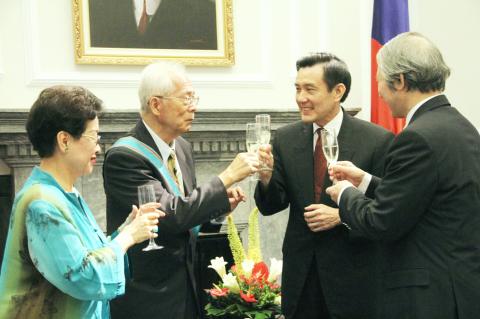President Ma Ying-jeou (馬英九) yesterday awarded former Judicial Yuan president Shih Chi-yang (施啟揚) and former Control Yuan presidents Wang Tso-jung (王作榮) and Chen Lu-an (陳履安) with the Order of Propitious Clouds with Special Grand Cordon.
It is customary to award former premiers, legislative speakers and the presidents of the Control Yuan, Judicial Yuan and Examination Yuan with the Order of Propitious Clouds with Special Grand Cordon after retirement, but since the finalization of the Constitution of the Republic of China (ROC), Wang, Chen and Shih were the only three administrative heads that had not yet been presented with such an award on stepping down from their positions.
The Presidential Office said that as the Medals Act (勳章條例) did not restrict presidents from awarding medals to administrative chiefs that had retired under previous administrations, Ma had decided to honor the custom and personally award medals to the three former civil servants.

Photo: CNA
The Order of Propitious Clouds with Special Grand Cordon was first given on Feb. 12, 1941, has nine orders, and is usually given to civil servants in recognition of extraordinary contributions made to the nation, or to civilians or foreigners whose actions have greatly contributed to the nation.
The Presidential Office said in accordance with Article 6 of the Medals Act: “Individuals making extraordinary contributions to the nation’s administrative, legislative, judicial, examination or control systems should be awarded the Order of Propitious Clouds or the Order of the Brilliant Star.”
Shih and his wife, Lee Chung-kuei (李鍾桂), attended the ceremony yesterday, and though Shih was unable to speak due to illness, Lee Chung-kuei said that it was one of the happiest days in her husband’s life.
When Ma conferred the award on Shih, the former civil servant held Ma’s hand tightly for a long time, overcome with emotion, but unable to express himself.
“When my husband heard the news, he felt he did not deserve such recognition,” Lee Chung-kuei said.
However, following tradition and to give thanks for the president’s concern they decided to accept the award, she added.
Born in 1936, Shih received his doctorate in law at Germany’s Heidelberg University in 1967.
He was a teacher in National Taiwan University department of law when Ma attended the university, and also served as deputy minister of education, vice premier, chairman of the Mainland Affairs Council and secretary-general of the National Security Council.
Shih was also involved with the committee that investigated the 319 Incident, in which then-president Chen Shui-bian (陳水扁) and then-vice president Annette Lu (呂秀蓮) were shot at on the eve of the 2004 presidential election.

The Ministry of Economic Affairs has fined Taobao NT$1.2 million (US$36,912) for advertisements that exceed its approved business scope, requiring the Chinese e-commerce platform to make corrections in the first half of this year or its license may be revoked. Lawmakers have called for stricter enforcement of Chinese e-commerce platforms and measures to prevent China from laundering its goods through Taiwan in response to US President Donald Trump’s heavy tariffs on China. The Legislative Yuan’s Finance Committee met today to discuss policies to prevent China from dumping goods in Taiwan, inviting government agencies to report. Democratic Progressive Party Legislator Kuo Kuo-wen (郭國文) said

The Ministry of Economic Affairs has fined Taobao NT$1.2 million (US$36,900) for advertisements that exceeded its approved business scope and ordered the Chinese e-commerce platform to make corrections in the first half of this year or its license would be revoked. Lawmakers have called for stricter supervision of Chinese e-commerce platforms and more stringent measures to prevent China from laundering its goods through Taiwan as US President Donald Trump’s administration cracks down on origin laundering. The legislature’s Finance Committee yesterday met to discuss policies to prevent China from dumping goods in Taiwan, inviting government agencies to report on the matter. Democratic Progressive Party

Taiwan and its Pacific ally Tuvalu on Tuesday signed two accords aimed at facilitating bilateral cooperation on labor affairs, according to Taiwan’s Ministry of Foreign Affairs (MOFA). The governments inked two agreements in Taipei, witnessed by Foreign Minister Lin Chia-lung (林佳龍) and visiting Deputy Tuvaluan Prime Minister Panapasi Nelesone, MOFA said in a news release. According to MOFA, the agreements will facilitate cooperation on labor issues and allow the two sides to mutually recognize seafarers’ certificates and related training. Taiwan would also continue to collaborate with Tuvalu across various fields to promote economic prosperity as well as the well-being of their

Sung Chien-liang (宋建樑), who led efforts to recall Democratic Progressive Party (DPP) Legislator Lee Kun-cheng (李坤城), was released on bail of NT$80,000 today amid outcry over his decision to wear a Nazi armband to questioning the night before. Sung arrived at the New Taipei District Prosecutors’ Office for questioning in a recall petition forgery case last night wearing a red armband bearing a swastika, carrying a copy of Adolf Hitler’s Mein Kampf and giving a Nazi salute. Sung left the building at 1:15am without the armband and covering the book with his coat. Lee said today that this is a serious